General News
Pantami Seeks Shift to Skill, not Certificate to Boost Digital Economy

Dr Isa Pantami, minister of Communications and Digital Economy, has advocated for shifting of focus from certificate to skills education for the actualisation of Nigeria’s digital economic drive.

Dr Isa Ibrahim Pantami
Pantami made the call at the Graduation Lecture of the National Defence Collage Course 28, titled; “Digital Economy and National Development in Nigeria”, on Tuesday in Abuja.
He said that digital literacy and skills was one of the pillars outlined for the development of the digital economy of Nigeria in line with the National Digital Economy Policy and Strategy (NDEPS).
The minister added that emphasis on certificate must be reduced in engaging labour force, urging that focus should be shifted to skills if the nation must catch up with development.
He said that many developed and developing countries such as China, United States and Morocco had shifted attention to skills rather than certificate, adding that many of them had established skills centres.
According to him, certificate is important but secondary to skill and that is why we must pay attention to skills in our journey to digital economy.
“The digital literacy and skills pillar recognises the fact that citizens are the greatest assets in any economy, including the digital economy. It will support the development of a large pool of digitally literate and digitally skilled citizens.
“We recently provided a platform, the DigitalNigeria.gov.ng platform, to enable Nigerians receive training in diverse digital skills. Over 36,000 Nigerians have enrolled on the platform since the 2nd of April, 2020.
“We are championing a paradigm change that lays emphasis on skills, in preference to merely having degrees without skills.
“The National Defence College is an institution that supports the development of skills and there are many digital techniques that can support the great work that you are doing here,’’ he said.
Pantami stated that the digital economy was a prime catalyst for development, adding that in less than one year, government’s modest efforts had already yielded remarkable results.
According to him, the recent first quarter Gross Domestic Product (GDP) Report released by the National Bureau of Statistics (NBS) showed that ICT contributed an unprecedented 14.07 per cent to Nigeria’s total real GDP.
The minister further disclosed that the national security architecture must key into the digital revolution in tackling the prevailing security challenge using digital technology.
He explained that emerging technologies came with different solutions to security challenges of every nation such as data analytics, artificial intelligence, robotic technology, drone and many more.
“These are some of the emerging technologies that will go a long way in promoting security of nations. The security officials are in better position to look into and see how to customize them and make use of them.”
Also, , Maj.-Gen. Bashir Magashi, minister of Defence, said the Federal Government had taken steps to adopt, adapt and internalise the digital economy in a functional manner.
Magashi, who was represented by Alhaji Sabiu Zakari, permanent secretary, said it was important that security and defence establishments show more than a cursory interest in the digital economy.
He added that the adaptation of digital economy could result in increased cybercrimes thus undermining national security.
“I wish to commend the Commandant, staff and the entire College community for their collective efforts in pursuing the ideals of the College.
“In particular, I commend you for organising the graduation lecture, which was exciting, educative and would be helpful to the economic and security needs of the Nigerian nation,’’ he said.
Earlier, Rear Adm. Markson Kadiri, commandant of the collage, , said the lecture had become a key component of the training programme of the College and a major highlight of its annual graduation ceremonies.
Kadiri said that a total of 107 participants had successfully completed the course comprising 67 officers of the Armed Forces of Nigeria, seven Senior Police Officers and 15 participants from key Ministries, Departments and Agencies (MDAs).
Others according to him, include 18 senior military officers from the Armed Forces of friendly nations.
“A large part of the Course was conducted online, after the general lockdown associated with the COVID-19 pandemic.
“The Course was conducted under the theme “Economic Diversification and National Development in Nigeria”. Economic diversification is a broad based strategy designed to cause positive and multi-sectoral economic growth and development,’’ he said.
General News
The Mood Market to Light Up Lagos with a Rooftop Gifting, Food & Lifestyle Fair this Christmas

This festive season, The Mood Market by Riella Luxé invites Lagosians and tourists to experience Christmas in a softer, more intentional way with her First Edition Christmas Fair, taking place on Monday, December 22, 2025, at Maison Fahrenheit VI (Rooftop) from 11:00 a.m. to 11:00 p.m. Entry is free and open to the public.

Designed as a lifestyle-led Christmas fair, The Mood Market is more than a shopping event. It is a curated rooftop experience built around mood, gifting, festive food, music, and community. The fair brings together intentional brands across candles, beauty, fashion, art, gourmet treats, and festive food offerings, all set against the Lagos skyline.
True to its name, The Mood Market allows guests to shop how they feel. The fair is thoughtfully curated into distinct mood zones, making it easier for attendees to navigate, connect with brands, and discover meaningful gifts that reflect emotion and intention rather than excess.
The defining moment of the evening will take place at 8 p.m., with The Mood Market Christmas Tree Light-Up Countdown, a first-of-its-kind festive moment aimed at creating a new Lagos Christmas tradition. The live countdown and lighting of the Christmas tree will symbolically mark “Lighting Up Lagos Christmas,” bringing guests together in a shared holiday celebration.
Food plays a central role in the experience, with a variety of festive food vendors offering comfort meals, holiday-inspired bites, and celebratory treats designed to complement the relaxed, lounge-style atmosphere. Guests are encouraged to eat, unwind, and stay, turning the fair into a full-day-to-night Christmas experience rather than a quick shopping stop.
Beyond shopping and food, the event promises an atmosphere designed for presence and relaxation. With DJ-led music throughout the day and into the evening, a dedicated lounge and chill area, and an open rooftop setting, guests can enjoy good music, festive meals, and conversations under the night sky.
Speaking on the vision behind the fair, founder and curator Gabriella P. Okechukwu shares: “The Mood Market was born out of a desire to change how people experience Christmas shopping. Instead of overwhelming fairs, we created a curated, rooftop space where people can shop their moods, enjoy good food and music, and find gifts that truly mean something. The Christmas tree light-up represents our vision of building a shared festive moment Lagos can return to every year,” Gabriella P. Okechukwu, Founder & Curator, The Mood Market by Riella Luxé
By blending intentional shopping, festive food, music, atmosphere, and tradition, The Mood Market by Riella Luxé positions itself as a refreshing addition to Lagos’ Christmas calendar; one that prioritizes mood, memory, and meaningful celebration.
General News
Jumia Kicks Off December Holiday Sale, Bringing Festive Deals to Shoppers Nationwide

Jumia Nigeria has launched its highly anticipated December Holiday Sale, unlocking a wide range of festive deals and savings for shoppers across the country from December 2 to December 28.

This year’s campaign goes beyond seasonal discounts, introducing a special sub-series titled “Celebrate Naija / Naija is Game,” running from December 15 to January 18. The initiative spotlights uniquely Nigerian themes and experiences, infusing the holiday season with cultural relevance and local inspiration.
The December Holiday Sale delivers a compelling mix of value, quality, and discovery, featuring the popular 12 Days of Christmas promotions, exclusive Brand Days, and deep-discount Anchor Deals across multiple product categories.
Speaking on the campaign, Temidayo Ojo, Chief Executive Officer, Jumia Nigeria, said the sale reflects the platform’s commitment to meeting the evolving needs of Nigerian consumers.
“The December Holiday Sale is our way of helping Nigerians celebrate the season without compromise. Today’s shoppers are value-driven, they want quality, convenience, and affordability. This campaign brings all three together with festive deals that address real household needs and aspirations,” Ojo said.
He added that strong Black Friday momentum continues on the platform, offering customers extended savings opportunities throughout the festive period.
On the creative direction behind the campaign, Lere Awokoya, Chief Marketing Officer, Jumia Nigeria, noted that the 2025 holiday sale is rooted in everyday moments that matter to customers.
“This year’s campaign is built around the joy of giving and daily value. ‘Celebrate Naija’ brings that spirit to life through culturally relevant themes and surprises that resonate across regions and lifestyles. We’re excited for Nigerians to discover everything we’ve curated—from gifts and essentials to dream purchases,” Awokoya said.
Shoppers can access deals across key categories including electronics, home and kitchen, fashion, beauty and personal care, and everyday essentials, with seamless online price discovery supported by Jumia’s nationwide logistics network.
Extending beyond major urban centres, Jumia’s fulfilment and pick-up infrastructure ensures customers in secondary cities and peri-urban communities enjoy the same festive prices without additional travel costs, turning convenience into tangible value.
With thousands of deals going live throughout the season, customers can expect faster deliveries, extensive pick-up options, and transparent pricing, making holiday shopping simpler and more affordable nationwide.
General News
Dangote, Monopoly Power, and Political Economy of Failure

By Blaise Udunze
Nigeria’s refining crisis is one of the country’s most enduring economic contradictions. Africa’s largest crude oil producer, strategically located on the Atlantic coast and home to over 200 million people, has for decades depended on imported refined petroleum products. This illogicality has drained foreign exchange, weakened the naira, distorted investment incentives, and hollowed out state institutions. Instead of catalysing industrialisation, Nigeria’s oil wealth became a mechanism for capital flight, rent-seeking, and institutional decay.

Dangote
With the challenges surrounding the refining of crude oil, the establishment of Dangote Refinery signifies an important historic moment. The refinery promises to reduce fuel imports to a bare minimum, sustain foreign exchange growth, ensure there is constant fuel domestically, and strategically position Nigeria as a regional exporter of refined oil products if functioned at full capacity. Dangote Refinery symbolises what private capital, technology, and ambition can achieve in Africa following years of fuel queues, subsidy scandals, and global embarrassment.
Nigerians must have a rethink in the cause of celebration. Nigeria’s refining problem is not simply about capacity; it is about systems. Without addressing the policy failures and institutional weaknesses that made Dangote an exception rather than the rule, the country risks replacing one failure with another, this time cloaked in private-sector success.
For a fact, Nigeria desperately needs the emergence of Dangote refinery, and its success is in the national interest. Hence, this is not an argument against the Dangote Refinery. But history warns that structural failures are not solved by scale alone. Over the year, situations have shown that without competition and strong institutions, concentrated market power, whether public or private, can undermine price stability, energy security, and consumer welfare.
The Long Silence of Refinery Investments
Perhaps the most troubling question in Nigeria’s oil history is why none of the global oil majors like Shell, ExxonMobil, Chevron, Total, or Agip has built a major refinery in Nigeria for over four decades. These companies operated profitably in Nigeria, extracted their crude, and sold refined products back to the country, yet never committed capital to domestic refining.
Over the period, it has been shown that policy incoherence has been the cause, not a matter of technical incapacity, such as price controls, resistant licensing processes, subsidy arrears, frequent regulatory changes, and political interference, which made refining an unattractive investment. Importation, by contrast, offered quick returns, lower political risk, and guaranteed margins, often backed by government subsidies.
Nigeria carelessly designed a system that rather rewarded importers and punished refiners. Dangote did not succeed because the system improved; he succeeded despite it. His refinery exists largely because of the concessions from the government, exceptional financial capacity, political access, and a willingness to absorb risks that institutions should ordinarily mitigate. This raises a deeper concern; when institutions fail, progress becomes dependent on extraordinary individuals rather than predictable systems.
The Tragedy of NNPC Refineries
If private investors stayed away, Nigeria’s state-owned refineries should have filled the gap. Instead, the Port Harcourt, Warri, and Kaduna refineries became monuments to mismanagement. Records have shown that between 2010 and 2025, Nigeria reportedly wasted between $18 billion and $25 billion, over N11 trillion, just for Turn Around Maintenance and rehabilitation. Kaduna Refinery alone is estimated to have consumed over N2.2 trillion in a decade.
Despite these expenditures, output remained negligible. This was not merely a technical failure but a governance one. Contracts were poorly monitored, accountability was absent, and consequences were nonexistent. In functional systems, such outcomes trigger investigations, sanctions, and reforms. In Nigeria, the cycle simply repeated itself, eroding public trust and deepening dependence on imports.
Where Is BUA?
Dangote is not the only Nigerian conglomerate to announce refinery ambitions. In 2020, BUA Group unveiled plans for a 200,000-barrels-per-day refinery. Years later, progress remains unclear, timelines have shifted, and execution appears stalled.
This pattern is revealing. When multiple large investors struggle to translate plans into reality, the issue is not ambition but environment. Refinery projects in Nigeria appear viable only at a massive scale and with extraordinary political leverage. Smaller or mid-sized players are effectively crowded out, not by market forces, but by systemic dysfunction.
Policy Failure and the Singapore Comparison
Nigeria often aspires to emulate Singapore’s refining and petrochemical success. The comparison is instructive. Singapore has no crude oil, yet built one of the world’s most sophisticated refining hubs through consistent policy, investor protection, infrastructure planning, and regulatory certainty.
Nigeria chose a different path: price controls, subsidies, weak contract enforcement, and politically motivated policy reversals. Refineries became tools of patronage rather than productivity. Capital exited, infrastructure decayed, and import dependence deepened. The outcome was predictable.
The Cost of Import Dependence
For years, Nigeria spent billions of dollars annually importing petrol, diesel, and aviation fuel. This placed constant pressure on foreign reserves and the naira. Petrol subsidies alone were estimated at N4-N6 trillion per year, often exceeding national spending on health, education, or infrastructure.
Even after subsidy removal, legacy costs remain: distorted consumption patterns, weakened public finances, and entrenched interests built around importation. These interests did not disappear quietly.
Who Really Benefited from the Subsidy?
Although framed as pro-poor, fuel subsidies disproportionately benefited importers, traders, shipping firms, depot owners, financiers, and politically connected intermediaries. Smuggling across borders meant Nigerians subsidised fuel consumption in neighbouring countries.
Ordinary citizens received marginal relief at the pump but paid far more through inflation, deteriorating infrastructure, and underfunded public services. The subsidy system functioned less as social protection and more as elite redistribution.
The Traders’ Dilemma
Why did major fuel marketers like Oando invest in refineries abroad but not in Nigeria? Again, incentives explain behaviour. Importation offered faster returns, lower capital requirements, and political insulation. Domestic refining demanded long-term investment under unstable rules.
In an irrational system, rational actors optimise accordingly. Importation thrived not because it was efficient, but because policy made it so.
FDI and the Confidence Problem
Sustainable Foreign Direct Investment follows domestic confidence. When local investors, who best understand political and regulatory risks, avoid long-term industrial projects, foreign investors take note. Capital flows to environments with predictable pricing, rule of law, and policy consistency.
Nigeria’s challenge is not attracting speculative capital, but building conditions for patient, productive investment.
Dangote and the Monopoly Question
Dangote Refinery deserves credit. But scale brings power, and power demands oversight. If importers exit and no competing refineries emerge, Dangote could dominate refining, pricing, and supply. Nigeria’s experience with cement, where domestic production rose but prices soared due to limited competition, offers a cautionary tale.
Markets function best with competition. Without it, price manipulation, supply risks, and weakened energy security become real dangers, especially in countries with fragile regulatory institutions.
The Way Forward: Competition, Not Replacement
Nigeria does not need to weaken Dangote; it needs to multiply Dangotes. The goal should be a competitive refining ecosystem, not a replacement of a public monopoly with a private monopoly.
This requires transparent crude allocation, open access to pipelines and storage, fair pricing mechanisms, and strong antitrust enforcement. State refineries must either be professionally concessional or decisively restructured. Stalled projects like BUA’s should be unblocked, and modular refineries should be supported.
The Litmus Test
Nigeria’s refining crisis was decades in the making and cannot be solved by one refinery, however large. Dangote Refinery is a turning point, but only if embedded within systemic reform. Otherwise, Nigeria risks trading one form of dependency for another.
The true test is not whether Nigeria can refine fuel, but whether it can build fair, open, and resilient institutions that serve the public interest. In refining, as in democracy, excessive concentration of power is dangerous. Competition remains the strongest safeguard.
Blaise, a journalist and PR professional, writes from Lagos and can be reached via: [email protected]

 E-Business3 days ago
E-Business3 days agoNigeria Police Arrest Okitipi, Nigerian Allegedly Linked to Microsoft 365 Hack

 E-Financial3 days ago
E-Financial3 days agoWorld Bank to Approve $500m Loan for Nigeria Today

 News3 days ago
News3 days agoNITDA Partners OGP to Drive Presidential Digital Goals

 E-Financial3 days ago
E-Financial3 days agoCustoms Slam 3 Percent Surcharge on Banks over Delayed Revenue Remittance

 Telecom3 days ago
Telecom3 days agoWhy Econet Wireless is Switching to VFEX

 E-Financial2 days ago
E-Financial2 days agoAccess Holdings Shareholders Approved to Raise N40bn Capital Through Private Placement

 General News2 days ago
General News2 days agoJumia Kicks Off December Holiday Sale, Bringing Festive Deals to Shoppers Nationwide

 E-Financial3 days ago
E-Financial3 days agoFidelity Bank Boosts Maternal, Child Healthcare @ESUTH

























